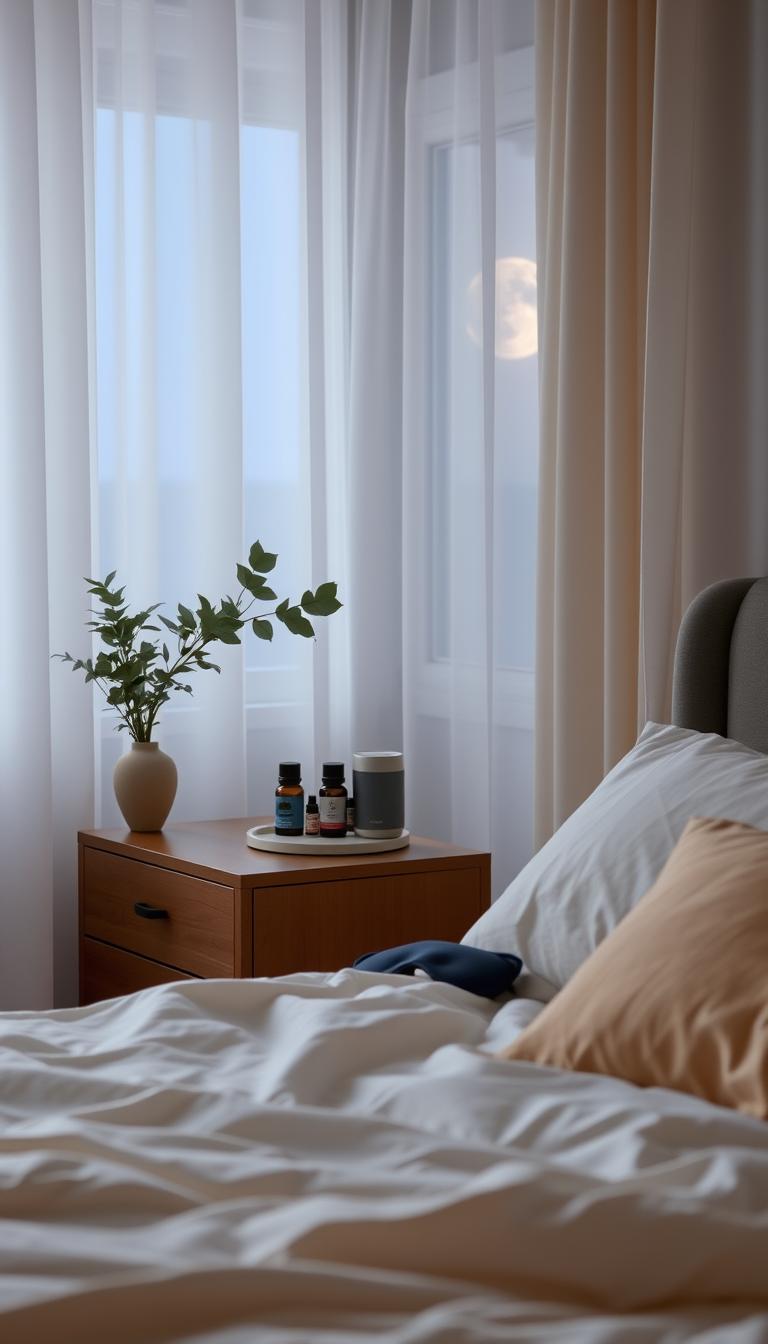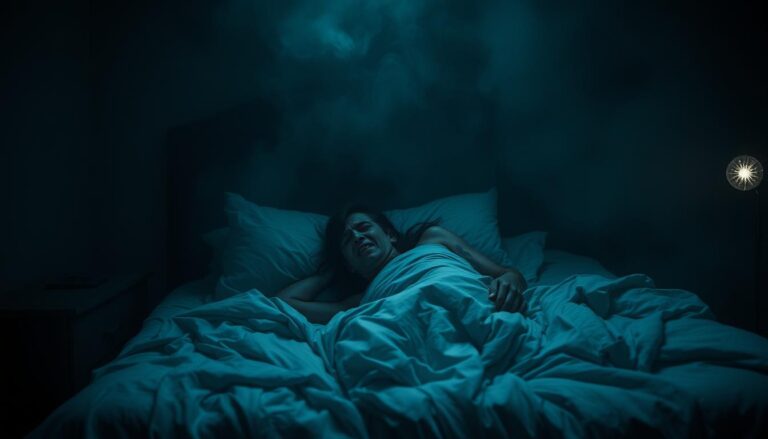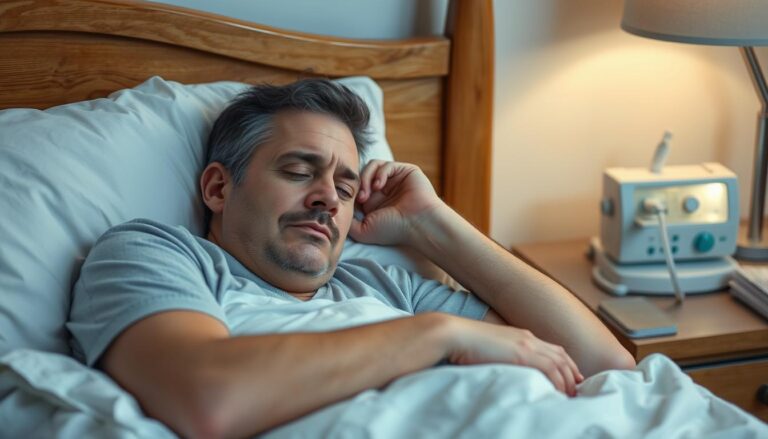
Did you know stress could lead to a condition that stops your breathing at night? The connection between stress and sleep apnea might surprise you. Over 20 million Americans live with sleep apnea, a serious condition often ignored. Yet, new research shows a hidden link: chronic stress may cause this disorder, harming your health.
Key Takeaways
- Stress and sleep apnea form a two-way relationship, worsening each other over time.
- Over 20 million Americans face sleep apnea, often tied to lifestyle factors like stress and BMI.
- Untreated sleep apnea raises risks for heart failure, strokes, and even car accidents.
- Dr. Andrea Lewis, a top provider with 30+ implant procedures, highlights the need for early intervention.
- Breaking the stress-sleep cycle could prevent severe health issues and improve daily life.
Understanding Sleep Apnea: More Than Just Snoring
Snoring is not always safe. Sleep apnea makes you stop breathing many times at night. Dr. Nammy Patel says these pauses can last from seconds to 30 seconds.
This can lower oxygen levels and wake you up. But you might not even notice. It can harm your heart and raise stress hormones, hiding a big health risk.
What Exactly Happens During Sleep Apnea?
Your airway can collapse or muscles relax, blocking air. Your brain wakes you up to breathe again. This breaks your sleep into pieces.
Johns Hopkins research shows these breaks can raise blood pressure and stress hormones. It’s like waking up 30+ times an hour. Your body never gets to fully rest.
Common Types of Sleep Apnea
| Type | Cause | Risk Factors |
|---|---|---|
| Obstructive (OSA) | Collapsed airway muscles | Obesity, smoking, male gender |
| Central (CSA) | Brain fails to signal breathing | Heart disease, opioid use |
| Mixed Apnea | Combines OSA and CSA traits | Advanced heart or neurological issues |
Obstructive apnea is in 90% of cases. Obesity can double your risk. Smokers are three times more likely than non-smokers.
Warning Signs You Shouldn’t Ignore
- Gasping for air or choking sounds at night
- Unexplained morning headaches or dry mouth
- Daytime fatigue even after “enough” sleep
Don’t confuse these with stress-related sleep disorders. High blood pressure, mood swings, and memory problems could mean apnea. If you snore loudly but feel tired all day, see a doctor.
These signs need attention to avoid heart problems or diabetes risk.
The Silent Epidemic of Chronic Stress
Chronic stress is like a hidden storm that quietly harms your health. It can mess with your sleep, making stress impact on sleep apnea worse. Find out how stress hurts your body and why it’s bad for your sleep and health.
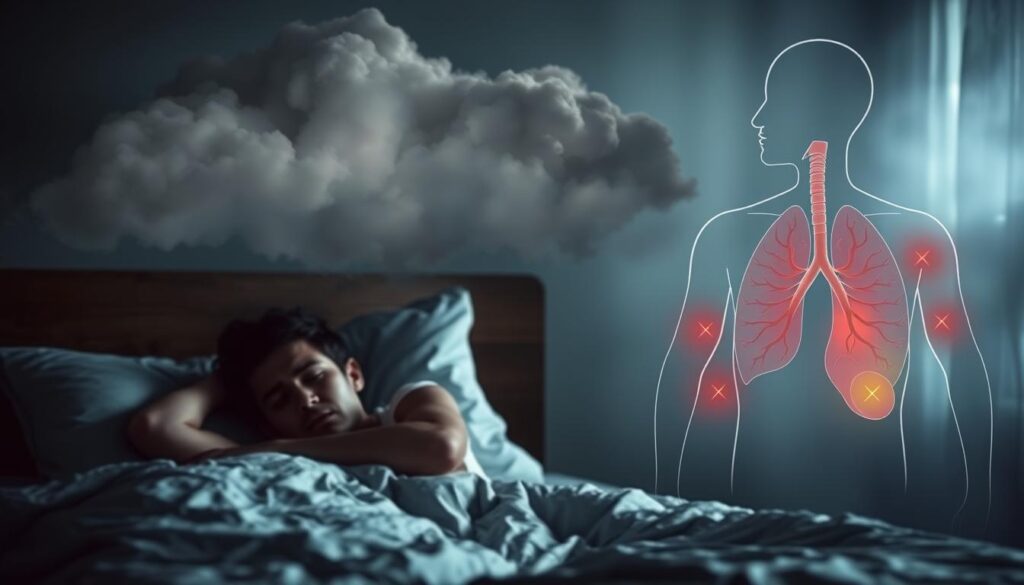
How Your Body Responds to Stress
When stress comes, your body makes lots of cortisol and adrenaline. These hormones make your heart beat fast, muscles tight, and breathing hard. This can make airways narrow, making sleep apnea worse.
Stress also makes it hard to fall asleep at night. Studies say 5–10% of adults have stress-related insomnia. This often comes from sleep problems.
The Long-Term Effects of Untreated Stress
Ignoring stress can cause serious harm. Here are some risks:
- Cardiovascular harm: Stress can lead to heart disease and high blood pressure.
- Metabolic shifts: Sleep apnea patients have high insulin and blood sugar levels, raising diabetes risk.
- Respiratory strain: Sleep apnea can block airflow during sleep, making breathing harder.
| Body System | Impact |
|---|---|
| Metabolic | Higher insulin (25.7 µU/mL) and blood sugar (106.2 mg/dL) in sleep apnea patients vs. controls. |
| Cardiovascular | 3x higher stroke risk in men with untreated sleep apnea. |
| Nervous system | Increased anxiety and racing thoughts, especially at night. |
Recognizing When Stress Becomes Dangerous
Watch for these signs:
- Chronic insomnia lasting over three months.
- Daytime sleepiness linked to fragmented sleep.
- Physical symptoms like chest tightness or racing thoughts at bedtime.
During the pandemic, 41% of adults said stress made their sleep worse. If stress is affecting your life, get help before it harms your sleep or health.
Can Stress Cause Sleep Apnea? The Science Explained
Researchers look into if can stress cause sleep apnea. Stress alone doesn’t usually cause it. But, it can make breathing problems worse for some people.
Stress makes your throat muscles tight. This narrows your airways and makes breathing pauses more likely. Dr. Patel’s studies show stress messes with breathing patterns, making it harder to breathe.
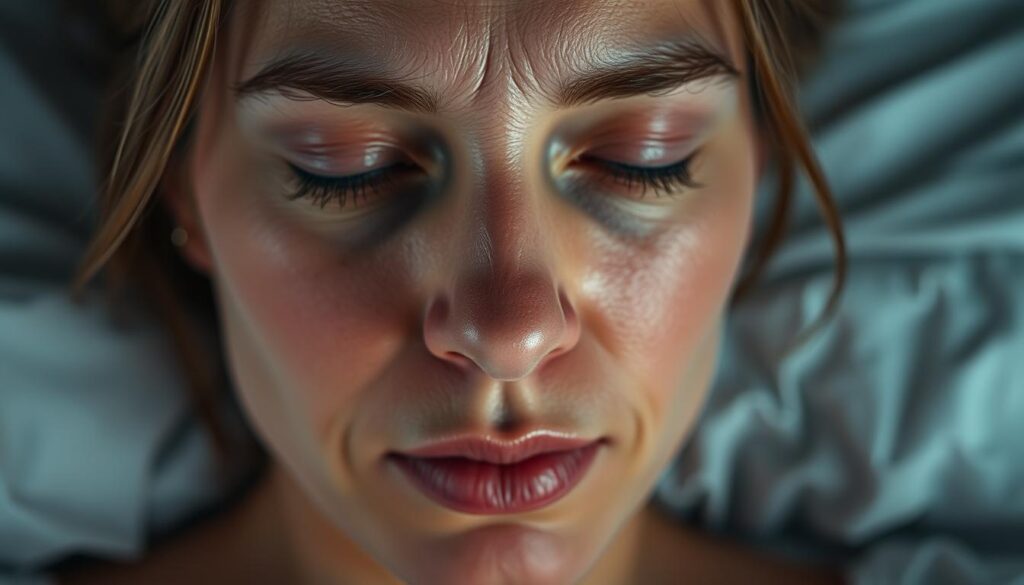
Cortisol, a stress hormone, messes with sleep. It lowers deep sleep, which is important for muscle relaxation. Stress also leads to bad habits like drinking alcohol or eating too much sugar. These habits make sleep apnea symptoms worse.
While stress-induced sleep apnea isn’t a sure thing, it increases the risk. People with high blood pressure or obesity, common stress problems, are at higher risk. Studies show stress can increase the risk of other health issues by 51% in some cases.
Stress doesn’t just affect breathing. It also tightens neck muscles, causes irregular heartbeats, and makes sleep poor. But, there’s hope. Stress management through exercise or therapy can help reduce sleep apnea episodes and improve breathing at night.
The Vicious Cycle: How Sleep Apnea and Stress Feed Each Other
Stress and sleep apnea create a never-ending cycle. Poor sleep makes you stressed, and stress makes sleep worse. Over 50% of sleep apnea patients also face anxiety or depression, showing the cycle’s real impact.
Why Poor Sleep Amplifies Stress Responses
Sleep apnea interrupts breathing, breaking up your rest. This stops deep sleep, where your brain resets stress hormones. Studies show that lack of sleep can shrink brain areas that control stress.
This makes you more sensitive to stress, leading to more anxiety.
“Sleep disruption creates a neurochemical imbalance that primes the brain for anxiety,” explains Dr. Linda Nguyen, a sleep medicine specialist.
How Stress Worsens Existing Sleep Apnea
Stress tightens throat muscles and disrupts sleep cycles. It can also lead to behaviors like late-night screen time or skipping meals. Here’s how stress affects sleep apnea:
- Muscle tension narrows airways during sleep
- Stress hormones delay REM sleep, increasing breathing pauses
- Anxiety triggers behaviors like midnight snacking that worsen apnea
Breaking the Cycle for Better Health
To break this cycle, you need to tackle both stress and sleep apnea. A 2020 study found that CPAP therapy reduced anxiety in 70% of patients. Combining treatments like:
| Stress Management | Sleep Apnea Interventions |
|---|---|
| Mindfulness exercises | CPAP machine use |
| Yoga or deep breathing | Weight management plans |
| Therapy for anxiety | Sleep position adjustments |

Small changes can make a big difference. Treating sleep apnea lowers stress hormones. Reducing stress improves sleep quality. This approach stops the cycle and lets you breathe easier.
Physiological Connections: Your Body Under Pressure
Stress and sleep apnea are connected in a big way. When you’re stressed, your muscles get tight. This tightness can narrow your airways, leading to breathing stops during sleep.
Imagine holding your breath all night. That’s what happens when stress makes your airways narrow.
“Shallow chest breathing under stress can become a habit, reducing oxygen flow and straining airways even when you’re resting,” explains Dr. Patel. “This pattern primes the body for sleep disruptions.”

Stress makes your body release cortisol, a hormone that keeps you awake. High levels of cortisol also weaken your throat muscles. This makes it harder for your airways to stay open at night.
Over time, this weakens your body’s ability to breathe well while you sleep.
- Stress-induced weight gain, especially around the neck, adds physical pressure on airways.
- Cortisol spikes can disrupt sleep cycles, leading to lighter sleep phases where apnea episodes are more common.
- Chronic stress raises inflammation, which can swell airway tissues, narrowing space for airflow.
Your body is like a system under constant pressure. Stress keeps your nervous system on high alert. This affects how you breathe and relax at night.
This stress and sleep apnea connection is real. It’s a chain reaction happening in your body every night.
Risk Factors: When Stress and Sleep Apnea Collide

Knowing your risk factors can help you understand the connection between stress and sleep apnea. We will look at who is more at risk and how daily habits affect this.
Who’s Most Vulnerable to Stress-Related Sleep Disorders
People in their 40s and 50s are more at risk. This is because of muscle and hormone changes with age. By 2040, 21.7% of Americans will be 65+, a group where OSA is common.
Postmenopausal women are 3.49x more likely to have OSA than premenopausal women. Mental health issues like anxiety or depression also increase the risk. People with major depression are 5x more likely to get OSA.
Environmental Factors That Exacerbate Both Conditions
Where you live and work can affect you. Here are some stressors that make both conditions worse:
- Noisy neighborhoods or shift work disrupting sleep cycles
- Air pollution increasing inflammation linked to breathing issues
- Financial stress or social isolation raising cortisol levels
Lifestyle Choices That May Increase Your Risk
Small choices can add up. Here’s how habits affect your risk:
| Behavior | Risk Impact |
|---|---|
| Evening alcohol | Relaxes throat muscles, worsening apnea |
| Sedentary lifestyle | Raises BMI, a key OSA risk factor |
| Irregular sleep hours | Disrupts stress hormones like cortisol |
A 10% weight gain increases severe OSA risk by 6x. But losing 10% of body weight? That cuts OSA severity by 30%. Small changes can make a big difference in the stress-related sleep disorders battle.
Diagnosing the Connection: What to Tell Your Doctor
Talking about stress-induced sleep apnea with your doctor is important. Tell them about your stress and sleep problems. These can be linked, like waking up a lot at night or feeling tired during the day.
Ask these questions during your visit:
- Could my stress levels be worsening my breathing during sleep?
- Should I track my stress triggers alongside sleep patterns?
- Are there tests to evaluate how stress hormones like cortisol affect my sleep?

| Test Type | Purpose | What to Expect |
|---|---|---|
| Sleep Study | Monitors breathing, snoring, and oxygen levels | Overnight lab or at-home device tracking |
| Stress Hormone Test | Measures cortisol and adrenaline | Blood or saliva sample analysis |
| Psychological Screening | Identifies anxiety or depression links | Questionnaires about mood and stress triggers |
Take a sleep-stress journal to your doctor’s office. Write down things like:
- Times of day stress feels worse
- Nights with interrupted breathing episodes
- Medications or lifestyle changes attempted
Ask for help from sleep doctors or therapists who know about stress-induced sleep apnea. Getting help early can make a big difference. Don’t wait for things to get worse.
Effective Stress Management Techniques for Sleep Apnea Sufferers
Managing stress for sleep apnea begins with calming your mind and body. Techniques to reduce stress can help with breathing and sleep. Let’s look at simple ways to make a big difference.
Mindfulness and Meditation Practices
Techniques like diaphragmatic breathing relax your body and improve breathing. Try these steps:
- 5-minute guided meditations to ease stress
- Progressive muscle relaxation to release jaw and neck tension
- Mindfulness apps like Calm or Headspace offer guided sessions
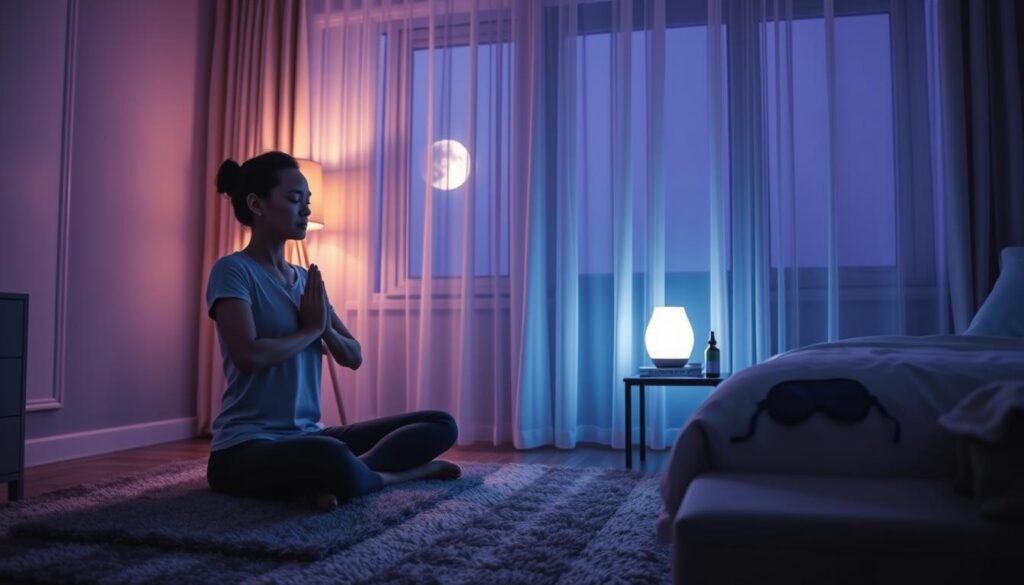
Even with a CPAP machine, these practices help you notice breathing patterns and reduce nighttime tension.
Physical Activity That Reduces Stress Without Worsening Symptoms
Moderate exercise like yoga or swimming can lower stress without overexertion. Follow these guidelines:
- Choose low-impact activities like walking or cycling
- Work out at least 3 hours before bed to avoid sleep disruption
- Incorporate gentle stretching to improve posture and breathing
Exercise boosts mood and energy without straining your airways.
Creating a Sleep-Friendly Evening Routine
Prepare your mind and body for sleep with this routine:
- Set a consistent bedtime and wake time
- Avoid caffeine after 2 PM and no alcohol 4 hours before bed
- Dim lights and use blackout curtains for a dark room
- Take 10 minutes for deep breathing or a warm shower
A calm environment and consistent schedule help your body prepare for restful sleep.
Treatment Options: Addressing Both Stress and Sleep Apnea
Dealing with stress and sleep apnea needs a two-pronged approach. Stress impact on sleep apnea makes symptoms worse. But, by combining treatments, we can overcome both issues.
Medical Interventions for Sleep Apnea
CPAP machines keep airways open with steady air pressure. Dental appliances and implants that stimulate the tongue are also options. For serious cases, surgery like UPPP can help by removing tissue that blocks breathing. 
- CPAP therapy helps breathing but needs regular use—many sleep 4 hours nightly with it.
- Studies show veterans using CPAP had 50% fewer PTSD-related nightmares.
Therapy Options for Stress Management
Stress management for sleep apnea begins with therapy. Try:
- Cognitive behavioral therapy (CBT) helps with anxious thoughts that disrupt sleep.
- Eye movement desensitization and reprocessing (EMDR) helps with trauma-induced stress.
- Mindfulness exercises calm the mind before bed, reducing stress at night.
“Combining medical and mental health care boosts recovery for both conditions,” says the National Sleep Foundation.
Complementary and Alternative Approaches
Yoga lowers cortisol, easing stress and improving breathing. Myofunctional therapy strengthens throat muscles to reduce apnea events. Cutting caffeine and keeping a regular sleep schedule also helps. Research shows yoga users report 30% better sleep quality.
Work with your doctor to mix these methods. A tailored plan can lower stress, improve breathing, and stop the cycle of poor sleep and anxiety.
Real Success Stories: Overcoming the Stress-Sleep Apnea Connection
Many people find relief by tackling the relationship between stress and sleep apnea head-on. Here’s how real individuals transformed their lives:

Susan Walters, a 54-year-old nurse, regained her energy after an implantable device improved her sleep. “The device reduced my nighttime pauses, and my morning stress melted away,” she shared. Her story shows how addressing sleep apnea can break the cycle.
- Executive Adam Lee: Combined CPAP therapy with stress reduction techniques for sleep apnea like yoga, lowering his anxiety by 40% in 6 months.
- Mom of Two, Maria Torres: Adopted a dental appliance and a 30-minute daily walk, cutting her apnea episodes by half.
- Retiree James Carter: Lost 30 pounds and practiced mindfulness, improving sleep efficiency by 65%.
| Name | Approach | Outcome |
|---|---|---|
| Susan Walters | Implantable device + counseling | 90% reduction in stress symptoms |
| Adam Lee | CPAP + mindfulness | Improved sleep duration by 2 hours/night |
| Maria Torres | Lifestyle changes + dental therapy | 60% fewer apnea events |
| James Carter | Weight loss + CBT | Eliminated daytime fatigue |
These journeys prove small steps matter. Try combining therapy with physical activity, or discuss devices with your doctor. Your path to better sleep—and less stress—is within reach.
Conclusion: Taking Control of Your Sleep and Stress
Understanding stress and sleep apnea is crucial. It helps break their harmful cycle. Over 25 million Americans have sleep apnea. Addressing both can greatly improve your health.
Chronic stress disrupts sleep, and poor sleep worsens breathing pauses. This cycle harms your heart, brain, and mental health. It raises risks for depression and anxiety.
Start by talking to a healthcare provider about your sleep and stress. If you have sleep apnea, a CPAP machine can help. Simple changes like avoiding screens before bed and practicing mindfulness can also help.
Even small steps, like adjusting sleep positions or having a calming evening routine, can make a difference. These actions help balance stress and sleep.
Data shows untreated sleep apnea can lead to heart disease and cognitive decline. But, taking action now can reverse these trends. Prioritize consistent sleep, seek therapy for anxiety, and use breathing exercises to calm your nervous system.
By tackling both conditions, you’ll boost energy, focus, and emotional resilience. Small daily choices can lead to lasting wellness.
Your health depends on balancing sleep and stress. Taking proactive steps today can lead to a healthier tomorrow. Remember, addressing this cycle is about rebuilding your strength to face life’s challenges with clarity and vitality.









